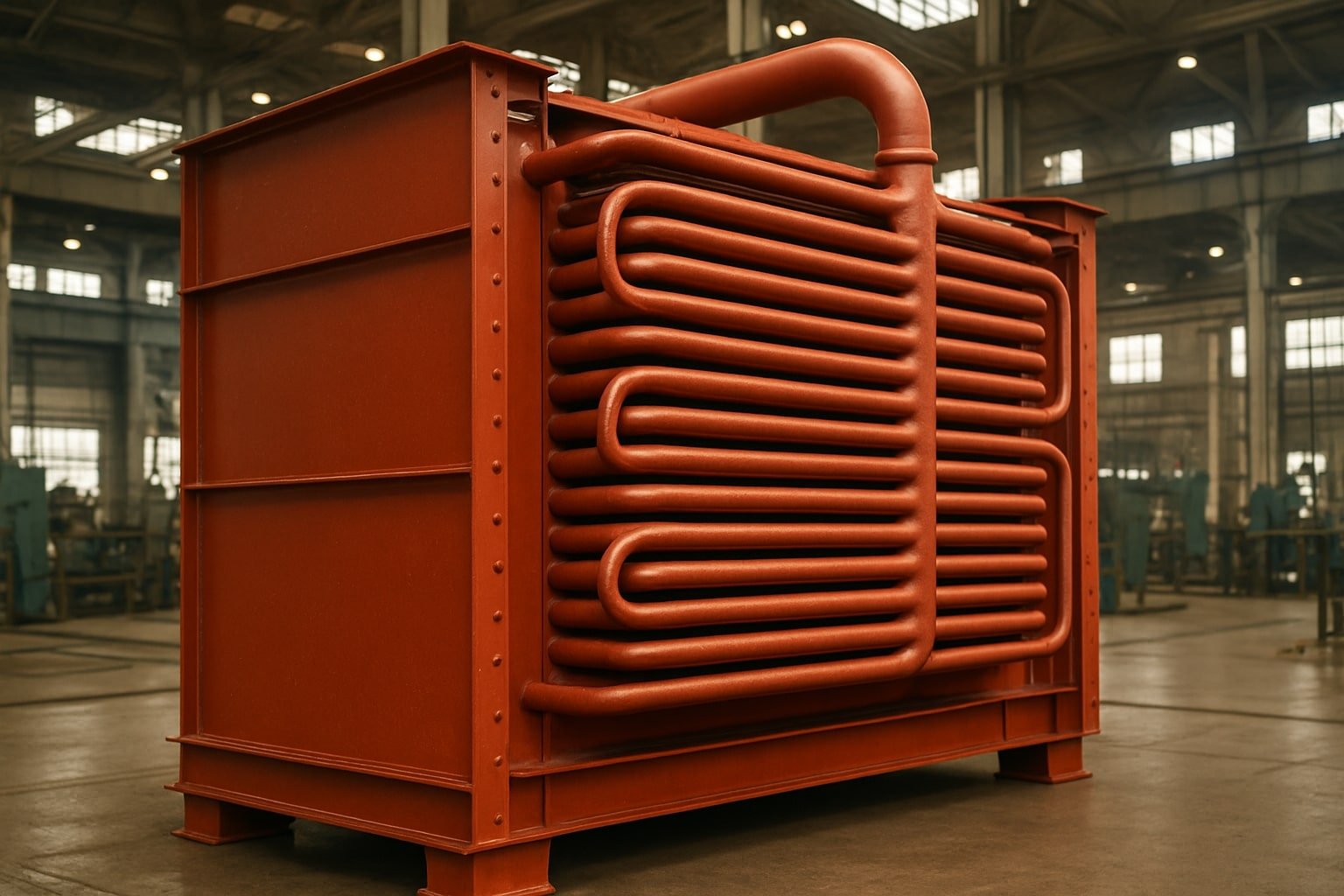Industries and power producers are facing mounting pressure to lower emissions, boost efficiency, and implement greener technology as the world’s energy environment moves towards sustainability. One element of thermal power plants is frequently overlooked in this quest, even though it is essential to increasing energy efficiency and lessening environmental impact. That part of the boiler system is called the economiser.
Despite its small size compared to the total boiler assembly, the economiser packs a powerful punch in terms of thermal performance and energy efficiency. This blog examines how boiler economisers greatly aid in the production of sustainable electricity and the reasons that they are essential to our shared goal of achieving net-zero.
What Is an Economiser in Boiler Systems?
An economiser in a boiler is a heat recovery device in the flue gas route. Its principal role is to extract residual heat from exhaust fumes and use it to warm boiler feedwater before it enters the steam drum or boiler shell.
The economiser guarantees that the feedwater enters the boiler at a higher temperature, lowering the fuel required for steam generation. This simple yet effective energy-saving strategy results in significant increases in boiler efficiency.
Sustainability Starts with Efficiency
Sustainability in power generation is fundamentally about reducing waste, including resources, fuel, and emissions. The economiser in boiler systems achieves exactly that:
1. Reduces Fuel Consumption
The boiler needs much less fuel to turn feedwater into steam when the economiser has already heated it. The consequent reduction in fuel use results in lower operating expenses and a lesser environmental impact, both essential for producing sustainable energy.
2. Lowers Greenhouse Gas Emissions
Less fuel burned equals fewer emissions emitted into the atmosphere. Integrating an economiser in boiler operations can significantly reduce CO₂, NOₓ, and SOₓ emissions, balancing environmental requirements and sustainability objectives.
3. Enhances Thermal Efficiency
An economiser can increase overall boiler thermal efficiency by up to 10%. This efficiency increase supports green energy goals and eventually results in significant fuel and cost savings for large-scale power plants.
The Role of the Economiser in Modern Boiler Design
The economizer’s design and performance become even more crucial as power plants transition to supercritical and ultra-supercritical boilers, which function at significantly higher temperatures and pressures.
In these environments, the economiser in boiler systems must survive harsh conditions. Advanced materials such as Inconel cladding and alloy steels are now employed to shield the economiser against corrosion, erosion, and thermal fatigue. Digitally integrated economisers are also increasingly utilised to optimise heat recovery, monitor real-time performance, and guarantee long-term dependability.
Long-Term Sustainability
Beyond the obvious energy and emissions benefits, the use of an economiser in boiler applications also contributes to the following:
- Lower wear and tear on boiler components
- Reduced maintenance frequency and costs
- Extended boiler lifespan
- Improved plant reliability and uptime
This makes it a cornerstone of sustainable plant management, supporting environmental goals and bottom-line performance.
Supporting Government and Industry Goals
Nations worldwide are establishing challenging goals for energy efficiency and carbon neutrality. Every watt of energy saved counts, whether through India’s National Action Plan on Climate Change (NAPCC) or the worldwide effort for decarbonisation under the Paris Agreement.
Incorporating economisers into boiler systems directly contributes to these objectives by making traditional fossil-fuel-based power generation greener, smarter, and more responsible.
Overcoming Challenges in Implementation
Of course, there are difficulties in putting an economiser into practice. This includes:
- Choosing materials to prevent corrosion from acidic flue fumes
- Optimal design to prevent condensation damage
- Frequent cleaning and inspection to avoid fouling or soot accumulation
However, with the proper engineering skills and maintenance procedures, these problems may be overcome, making the integration of an economiser a wise long-term investment.
The Future: Smarter, Greener Economisers
The future generation of boiler economisers will not only be passive heat exchangers but intelligent systems capable of:
- Real-time monitoring of the temperature and flow
- Adapting performance dynamically based on load
- Integrated with AI-powered boiler control systems
- Providing proactive maintenance notifications
These features will further enhance boiler efficiency, establishing the economiser as a critical component of the power generation Industry 4.0 shift.
Conclusion
As the power industry moves towards a more sustainable and efficient future, simple but important technology, such as boiler economisers, will be critical in shaping that path.
More than just a part, the economiser is a catalyst for clean power by recovering waste heat, increasing energy efficiency, cutting emissions, and using less fuel.

